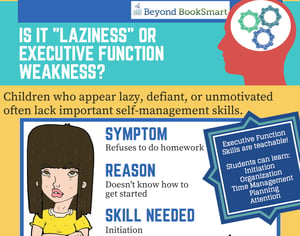Students in elementary school often have good reason to feel anxious. Whether it’s  taking tests in class, handling unexpected changes in a schedule, or remembering to take their materials home or to school, young students have a number of daily demands that require using their Executive Function skills. And because those very skills are still developing in their brains, elementary-aged kids won’t always be able to cope with their daily challenges without a little guidance from the adults in their lives. Here are a couple of scenarios that illustrate the connection between a student’s anxiety and gaps in their Executive Function development - and ways that parents can help bridge those gaps to build skills in their children.
taking tests in class, handling unexpected changes in a schedule, or remembering to take their materials home or to school, young students have a number of daily demands that require using their Executive Function skills. And because those very skills are still developing in their brains, elementary-aged kids won’t always be able to cope with their daily challenges without a little guidance from the adults in their lives. Here are a couple of scenarios that illustrate the connection between a student’s anxiety and gaps in their Executive Function development - and ways that parents can help bridge those gaps to build skills in their children.
Test Day Blues
Nathan wakes up with his stomach in knots. He just remembered it’s Tuesday. Spelling test day. The WORST day of the week. “Everybody else seems to remember how to spell stupid words like cough and rough. Why can’t I?” He tries to tell his mom he just can’t eat breakfast because he’s too sick, but then she gets tricky and lets him eat a slice of his favorite, blueberry pie, to start his day. Nathan can’t pass that up and so his hope for a spelling-test-induced sick day disappears as fast as that flaky crust on his plate.
A Connection Between Nathan’s Test Anxiety and Executive Function
Nathan loves reading and even reads a bit above his grade level. It’s just those darned spelling words that cause him to feel anxious when it’s Tuesday Test day. It feels crummy to see all those red marks on his paper and it makes Nathan worry that maybe he’s not the smart kid he thought he was. He seems to get plenty of practice with the spelling words each week, writing them out several times each and quizzing himself with flashcards he makes for homework. So what’s going on here? When we dig a little deeper, what we notice is that Nathan likes to multitask when he does his spelling homework because he finds it “super boring.” In between playing tug-of-war with his beagle, Ace, he gets through a few flashcards. Instead of spelling his words out loud, he keeps it all in his head and when he turns over the flashcard convinces himself that he got it right or that he was going to say it like that anyway. In terms of Executive Function, Nathan hasn’t developed the metacognitive skill (that is, an understanding of his own learning) to realize that his methods aren’t working well for him. Developmentally, metacognition is a relatively advanced ability, so it’s typical for elementary-aged students to have trouble in this area.
A New Way to Study
Knowing how dull Nathan finds studying his spelling words, we need to inject a little fun and remove his Ace distraction while he works. Once we know Nathan’s full attention is on the work at hand (and the beagle is out of barking range), he might try a more active way to practice what he needs to learn. Nathan could be encouraged to walk (or march, or dance) around his dining room table (where he typically sits) and practice spelling each word out loud as he does his laps. If he gets it right, he could high-five his mom who’s nearby. This way, he gets to work off some energy and is reinforced for his accuracy. Another boredom buster is to switch up how he studies. The following day, he could try a mock test with his mom or his older sister. Research shows that self-testing is the best way to be assured that students have truly learned the material they’re studying. With the self-tests, Nathan will find that he can’t fool himself into thinking he knows something when he doesn’t. He’ll build his awareness of himself as a learner, especially if he is asked to reflect on his experience. Nathan may find himself telling his parents, “I figured out that when I make something kind of boring into a game, I get through it faster. I like that!” Before you know it, Terrible Test Tuesday is just a ghost from the past, and Nathan has gained some metacognitive muscle that will help him way beyond elementary school.
Gym Day Worries
Emily loves gym class. Get Off the Island and Pac Man Tag are her favorites and she looks forward to Ms. Swenson’s gym class on Thursday. But Ms. Swenson is very strict about having the right footwear. And sometimes the gym schedule gets changed up in ways that Emily has a hard time remembering. Last month, she had to sit out when they were using hula hoops because she wore her flip flops and Ms. Swenson said it wasn’t safe for her to participate. That was embarrassing - and Emily never wants that to happen again. This drizzly morning, she found herself on the bus and she suddenly worried that it was a gym a day and that her rain boots would make her have to sit out gym class AGAIN. Her stomach churned all the way to school until she found her best friend Maya and asked her if it was a gym day - thankfully it wasn’t!
A Connection Between Emily’s Anxiety and Executive Function
Emily has a tough time keeping track of the days of the week and remembering what she’ll be doing on each day - it’s even harder when the schedule gets changed for half-days and special field trips. It all just feels kind of unpredictable and annoying to Emily. In terms of Executive Function, Emily has some challenges with memory, planning, and cognitive flexibility (the ability to adapt to changing circumstances). Elementary school students are typically works-in-progress for these skills - and it’s not at all unusual for them to encounter difficulties that can lead to anxiousness.
A Way to Envision the Day and Week Ahead
Emily mostly relied on her dad to let her know what day it is and what she needed to take with her to school. But sometimes her dad traveled and her grandmother stayed at the house to watch over Emily and her brother. Grandma Kate didn’t always know Emily’s school schedule as well as her dad. One solution that would benefit the whole family would be to have a large paper or whiteboard calendar in the kitchen. Emily’s dad could fill it out for the week ahead and help Emily to (literally) see what her week looks like. On gym day Thursday, Emily could draw a picture of her purple sneakers on the calendar to help her remember what to wear that morning. Better yet, on Wednesday night, (and each night) Emily can be urged to look at what she needs for the next day and to prepare it right by the door so she won’t forget. When those unusual days pop up and her schedule is changed, her dad can put a big exclamation point on that day in the calendar to alert Emily to expect a change. Over time, Emily can build her planning skills by taking over some responsibility for filling in the calendar for the coming week. Now that her schedule is visible and she can check it herself, Emily is likely to feel less anxious because she’ll know she’s prepared for her school day and she won’t have to sit out any of the fun in Ms. Swenson’s class again.
Life in elementary school doesn’t need to be so stressful. When the source of a student’s anxiety is stemming from Executive Function challenges, there are many ways to intervene and help build the skills kids need to feel confident and successful.
Photo by Annie Spratt on Unsplash
 Is it "laziness" or Executive Function weakness? Download our colorful infographic that highlights 5 common symptoms.
Is it "laziness" or Executive Function weakness? Download our colorful infographic that highlights 5 common symptoms.

